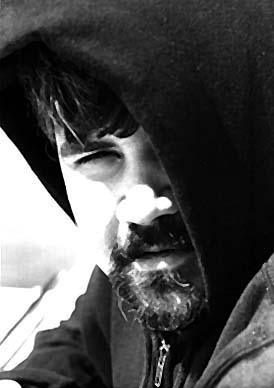The Butterfly Defect
By James Valvis
“The whole premise is stupid,” he said.
“How so?”
We sat in a café in May of 2069, roughly 80 years before I was born. He hopped a ride with me to save money. He said he did a lot of time travelling, but he always did it on the cheap. No luggage, no insurance if he lost his time visa, all his visits in the low-demand early days of time travel where criminals like me were sent. His was a life of high risk for dubious reward.
“Listen,” he said. “First, I want to thank you for letting me hop that ride. I know you weren’t given a choice, but you were extra pleasant about being so close all those decades. I realize ― getting sent back here ― I mean, permanently―”
“No problem,” I said. “I’m glad you agreed to share a couple of drinks. I’ve been enjoying our conversation. It’s not often I meet someone who’s also fond of the old science fiction curiosities. You were saying Bradbury’s story. What was it called?”
“A Sound of Thunder.”
“Oh, that’s right. I read it once when I was a kid. I thought it pretty simplistic.”
“You need to understand, Bradbury was writing in an era before there was rudimentary time travel. The first time visa wasn’t even issued until 2078, twenty years after the invention of time travel. That means the story predates the real thing by more than a century. I greatly respect those early prophets. They paved the way. However, Bradbury was so wrong in that story, it’s quite fantastic.”
Smiling, carefree, completely at home in these squalid surroundings, the tourist was people-watching. I caught him staring at a Mexican girl who was playing in the mud. 2061 wasn’t long after the Great Western Schism, and the girl was missing a leg, probably from stepping on a landmine.
I wanted to bring his attention back to me. I didn’t know the next time I would enjoy the company of one of my contemporaries. “For instance?” I asked.
Still smiling, he sipped his beer. He was taking a risk consuming past stuff. I no longer had a choice, but as a tourist he was taking a chance. Back in our time, he would be able to clear out any radiation or poison or illness in his system, but he needed to arrive home first, and that would mean taking his time visa to the only away portal in the area. And that was all the way across town. “You know the story, right?”
“I vaguely remember.”
“So okay, it’s like this. A guy goes back in time to hunt a T-Rex, but he soils his shorts, runs off the established path, and steps on a butterfly. Killing this butterfly changes everything about the future, messing with the English language and putting in power a government that they don’t like. Did I sum it up right?”
“More or less. As far as I recall.”
“Well, putting aside the issue of travelling back into a time before time travel was invented, which we know is impossible, since you can’t arrive at a time that has no portal ― putting that aside, the first problem is that if the future changes, people on the hunting expedition change also. If you are going to buy the idea that if you can change the future, the minute that guy killed his butterfly all the men in his group would have changed too. They might not be there, some of them, and those who remained might have been fine with those altered election results. Why not? Obviously, the new winning candidate would have been more popular. Either way, the hunting party would not have known anything changed.”
“Interesting,” I said.
“Wait, wait, wait. But it gets nuttier. What happens if the guy who stepped on the butterfly now never goes back in time to step on the butterfly because he stepped on the butterfly? See what I’m saying? You’ve created a paradox. It’s impossible.”
“You’re right. Like I said, it’s a simplistic tale. I don’t think Bradbury meant for us to look at it this closely.”
“But it doesn’t end there,” the tourist said, too excited about his subject now to quit talking. In general, he seemed the kind of man who had trouble controlling his urges. Drinking an ancient beer told me that. So did the way he ran his thumb along his lower lip as he looked out into street.
“What else?” I prompted. Why not? I was enjoying our talk.
“Okay,” he said, returning from whatever daydream momentarily consumed him. Blinking, he went on, “Where were we?”
“It doesn’t end there.”
“Okay. Right, right,” he said. “Anyway, so supposedly they mean to kill this T-Rex at the moment it died. Now, never mind the pathetic lack of sport in killing a thing as it dies in another fashion, but this is simply impossible. You cannot act on an environment without changing it. That’s Science 101. First grade students know even observation affects results. Being there breathing ancient air would be enough, under Bradbury’s terms, to alter the future, never mind shooting rifles that will modify the trajectory of the animal’s fall. Consider if the T-Rex falls on one side of the tree or another. On one side he kills one kind of butterfly and on the other another kind of butterfly. Each kind would alter their future, regardless of what the guy who panicked stepped on.”
“I see what you’re saying,” I said.
“And that’s not all. The sound of rifles firing could send a bird flying off his tree and a critter scurrying into a hole. Because of this, the bird goes on to meet a different mate, and the critter is eaten by a predator later that week. Havoc would ensue. At least it would if Bradbury got it right.”
“Well, if this is all true, what does it mean?”
“It means we each retain our own time flow. If you travel back in time, your time flow goes from 2191 to 2069 and back to 2191. Though you’re in the past, you’re still moving forward in time.”
“But what happens if I kill my grandfather as a boy?”
“Nothing.”
“Nothing?”
“That’s right. You still exist, and your mother still exists, and the past rearranges itself as if you were never back here. Your grandfather dies but not really. Or let me put it this way ― if I were to take out a gun and mow down this entire block and bomb every building, by mid-afternoon tomorrow, it will be like nothing ever happened. The people will all be home having lunch, and all these buildings will be all right back where they now stand.”
“I see. And so that’s why—“
“Exactly. That’s why they send guys like you back here and guys like me hop a ride. You can go about your business, and I can go about mine.”
“You mean,” I said, “your attraction to children?”
“How did you know?”
“You possess a staring problem.”
“I don’t deny it,” he said. “Through the ages, even in our enlightened age, it’s been frowned upon. But back here, in the meaningless past, I can indulge. I play out my fantasies and live as I please, and then I return home and prosper like any citizen. I’m not a criminal like you, doing it in my own time where I’ll be caught and sent to the remote past permanently. I have some semblance of self-control. By the way, you never said why they shipped you back.”
“Murder,” I said.
“Kinky,” he said. “What kind? Serial? Oedipal? You like chopping up prostitutes?”
“Nah. Nothing that interesting. Just some vigilante stuff. You know, chasing scumbags and putting them out of society’s misery.”
“Oh ― right,” he said. “Okay, well, you should find plenty of such people here. Lots of bad guys running around in 2069. A whole planet full of them, and they can’t send them into the past like we can. Can’t do anything with them but lock them up and let them out again. Not that it will mean anything. All of these people are off the timeline. It’s like shooting ducks at the carnival. They just pop right back up in time again. But I guess you know that.”
“Not all,” I said, “are off the timeline.”
“Who isn’t?”
“Well … you.”
“Listen, you’re starting to weird me out. It’s been nice talking, but it’s time to go. And here’s the thing. If I see you again, or I hear a strange noise, I’m going home.”
“Need a time visa,” I said.
“Well, mine is right…”
“In addition to being a vigilante, I’m a pickpocket,” I said. “You forget how close together we were forced to stand. And a time-hop is so distracting it was child’s play.”
“That visa is coded to my DNA. You can’t use it.”
“Don’t want to use it. I want to stay here, where I can hunt travelers like you, people who think the past is theirs to do with as they please. Why do you think I let them catch me? I wanted to be sent here. This is when all the action is.”
“This isn’t happening,” he said. He looked like he wanted to stand and run, but thought better of it. He knew I could outrun him and kill him before he reached the door. Besides, I held his ticket out of this time. Instead of trying the violent route, which would have ended up badly for him, something he was smart enough to realize, he tried to smooth talk me. “Don’t you see? It doesn’t mean anything. All the people, these boys and girls. They’re just props, characters on a stage. They’re like a dirty movie. They’re live simulation characters. They aren’t human.”
“Of course not,” I said. “To men like you, nobody is human. Nobody. Not that boy. Not me. Nobody. But come on. Let’s buy another round. I’m having fun. We can talk some more about Bradbury and changing the future.”
“I’d rather not.”
“A pity.” I smiled and craned my neck to look out the window, down a long road. The sky in the distance was full of angry dark clouds. Already people were leaving the street, packing their belongings and heading for cover. “Looks like rain,” I said. “Seems like there’s some thunder in your future.”
 Born and raised in New Jersey, James Valvis has placed poems or stories in Ploughshares, River Styx, Tough, Daily Science Fiction, Hot Metal Bridge, Arts & Letters, Nimrod, Rattle, Southern Indiana Review, Natural Bridge, The Sun, and Best American Poetry 2017. His poetry was featured in Verse Daily. His fiction was chosen for Sundress Best of the Net and won 2nd Place in Folio’s Editor’s Prize. His work has also been a finalist for the Asimov’s Readers’ Award. A former US Army soldier, he lives near Seattle where he collects toy robots and plots his world domination, starting with cleaning the kitchen. You can find him online at http://www.valvis.net/writing/
Born and raised in New Jersey, James Valvis has placed poems or stories in Ploughshares, River Styx, Tough, Daily Science Fiction, Hot Metal Bridge, Arts & Letters, Nimrod, Rattle, Southern Indiana Review, Natural Bridge, The Sun, and Best American Poetry 2017. His poetry was featured in Verse Daily. His fiction was chosen for Sundress Best of the Net and won 2nd Place in Folio’s Editor’s Prize. His work has also been a finalist for the Asimov’s Readers’ Award. A former US Army soldier, he lives near Seattle where he collects toy robots and plots his world domination, starting with cleaning the kitchen. You can find him online at http://www.valvis.net/writing/
Featured image via Pete Linforth




